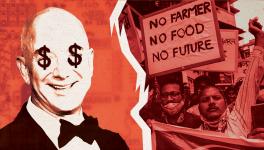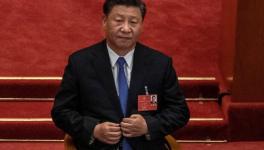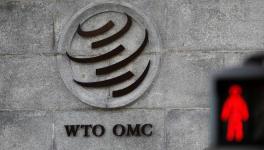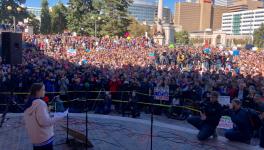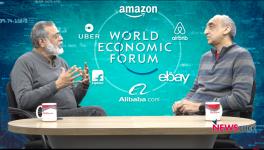WSF and WEF: Study in Contrast
This January, the World Social Forum celebrated its 10 years of activity. For a review of these 10 years, a review was organized in Porto Alegre reflecting on what has changed during these last 10 years. Interestingly, the World Economic Forum in Davos, which was held at the time found little time for reflecting on itself. Perhaps any introspection would have brought out its failure to predict the global financial meltdown and would have raised uncomfortable questions regarding its continued utility.
For the media, the Davos Forum is where all the action was. This is what they covered – the minutiae of what the rich and powerful said or did. The WSF which has often gathered more than 100,000 activists from all over the world does not merit mention, unless they can sensationalise it. This time, the 30,000 odd activists and thinkers merited barely any mention in the global media. Only the Brazilian press reported the event; that too because Lula launched his party’s presidential candidature from Porto Alegre during the forum.
During these ten years that the WSF has been in existence, it has provided a global counterpoint to the WEF in Davos. The World Social Forum started at a time when the neo-liberal world was in its triumphalist moment. The Soviet block had collapsed and the market was the unquestioned god -- at least in the dominant view amongst economists. The call that came out of Davos was privatize, globalise and deregulate, what Stiglitz called bribersize, re-colonise and corporatise the world. It predicted an uninterrupted growth for the world and global capital, provided its tenets were observed by all countries. It was Davos that set the agenda for global capital and the rich countries imposing their will and free flow of capital on the world.
The World Social Forum was a place within which this paradigm was seriously challenged. It was a place that the anti-neo liberal globalisation forces came together. It isalso instructive that the World Social Forums predictions were far more prescient than the WEF: the cyclical crisis of capitalism was by no means over and would come sooner rather than later.
also generated two major calls -- the collapsing Cancun WTO talks and also the anti War campaigns on the Iraq War. Derailing the WTO talks in Cancun was a significant achievement for the anti liberalisation movements and WSF played a significant role in this. The movement against Iraq War brought the anti war and the anti liberalisation forces together and mobilised hundreds of thousands all over the world. Even though it failed to stop the Iraq War, its contribution to de-legitimising the war is by no means insignificant.
In different parts of the world, different movements came together -- across geographical and also ideological divides. In India, 2004 Mumbai WSF helped the forces fighting the BJP and other right wing parties then in power to meet in a common space. It did not produce a radical alternative, but defeating the right-wing forces then was very important. In different parts of the world, it allowed radical politics to affirm itself. It also helped in building a network for movements both in countries and across countries.
If we look at the WEF, it has remained as a massive Public Relations exercise for global capital. It has made no attempt to look critically at the question of the two kinds of crisis we face. One is the economic melt down and what role markets played in this scenario. The other is the civilisational crisis which challenges the comfortable belief that consumption and GDP growth can last forever, without consequence to the finite resources of the world. It refuses to engage with the question whether we have enough resources for human greed, even if there is enough for human need. For WEF, Climate Change is another name for trading air read carbon credits and make money from green technology. Davos does not lend itself to any serious analysis of the world. Let alone a critical one.
In striking contrast, WSF focussed on these questions. How do we build a society that addresses the fundamental needs of humanity and is yet sustainable? What kind of society should we build that gives entire humanity a future? How do we build a knowledge society without surrendering to global monopolies? How can people take control of their natural resources and not surrender them to predatory capital? From Bolivia to India, these are the questions people are asking and the WSF platform resonated to such questions. This was the introspection as also the discussions on the way forward for the movements that are part of WSF process.
There are some major debates as well. Since its beginning, World Social Forum has been criticized by some people for being only a kind of social event, in which nothing is decided. The idea that WSF should become a place we draw up resolutions and decide on some joint action is not the way I would look at the WSF. The movements that have to change society have to work within their countries and also locally. What they share are ideas and forms of protest. This is where the deficit lies, not in its ability to create global joint action platform.
Movements and people came to WSF because they felt beleaguered in a world where the radical views were being systematically being erased. Today, they may not need a WSF for that. It is this new role that WSF must begin to craft. May be we should focus on more interrogation of what kind of struggles and what kind of new society we want and not a place where people came largely for affirming radical politics. What we need today is to move beyond the anti globalisation platforms to a positive agenda of what kind of world do we want. With the crisis of neo-liberal policies, we really need to carve out alternate trajectories. Whether WSF survives or fades out will depend on its role in carving out this alternative path to development.
Get the latest reports & analysis with people's perspective on Protests, movements & deep analytical videos, discussions of the current affairs in your Telegram app. Subscribe to NewsClick's Telegram channel & get Real-Time updates on stories, as they get published on our website.










